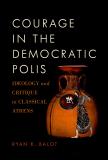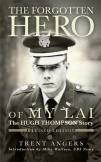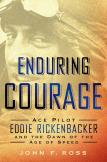On Being Brave: Stories from the front lines
On May 17, 1918, the 28-year-old Eddie Rickenbacker and his friend Reed Chambers took off in their French-made Nieuports in search of German targets in the early morning skies of war-torn France. Rickenbacker had made his first kill just a few weeks before and he was gaining confidence, a quality he kept in good supply. But at 20,000 feet, oxygen flow to the blood and brain slows, judgment is impaired, and the open cockpit is freezing cold. Following Chambers, Eddie turned back toward the base; but he spotted three German Albatrosses far below. He picked a target and zoomed down, squeezed off 50 rounds with his machine guns and watched the German tumble into a death spiral.
Suddenly, with a second Albatross on his tail, he jerked his stick back into his stomach to snap his dive into a climb. The fabric covering his right upper wing ripped back from its wooden ribs. His engine coughed, then stopped, sending his Nieuport into an uncontrolled tailspin. He fought madly, jerking the stick and shifting his body weight from one position to another to no avail. As his whole life ran through his mind like a moving picture, he wondered whether the plane would disintegrate and allow him to fall free, strike the ground and “splatter all over” or let him land in a tree. He had seconds to live. Still cool, he threw his weight and jammed the controls. Something exploded and the plane pulled out and headed for France. He landed so hard the wheels crushed into the fuselage; he staggered out and vomited behind the barracks.
Rickenbacker had a hard life. When his father died in a fight, Eddie quit school and developed a genius for mechanics. When car racing was fresh and unregulated, and both drivers and spectators died from crashes and explosions, he redesigned engines and cars and made himself one of the fastest drivers in the nation. His zeal for racing led naturally to his determination to fly. In his squadron, surrounded by upper-class young pilots from Ivy League universities, including Theodore Roosevelt’s son, he proved himself their superior, the top “ace” with a record 26 kills. As a squadron leader he demanded teamwork; their planes flew close to one another not just for protection but for psychological support.
As an airline executive in 1941, he survived a plane crash in Georgia, sustaining broken and crushed bones and an eye popping out of its socket, leaving him hospitalized for four months. In 1942 on a secret mission to deliver a reprimand to General Douglas MacArthur, his B17 got lost and crashed in the Pacific. He assumed command of the eight men in three small rubber rafts. They survived for 24 days on three oranges and an occasional fish, but no fresh water until it rained. His strategy was to keep the team together by discipline. Any signs of “quitting” he punished with scalding verbal abuse. Using one survivor’s pocket New Testament, he led prayer services and uninhibited discussions in which they confessed their lives and failures to one another till the heat wore them down. One survivor recalled, “Lord, how they learned to hate that man.” Yet it was better they hate him than think about death.
With a ghostwriter’s help and some exaggerations, he told his story several times in magazines and books; now the biographer John F. Ross has retold it as a model of courage. In 1968 Eddie told a journalist the United States should forget peace talks with North Vietnam but “bomb the living hell” out of their ports, because war is “kill or be killed.” God did not save him because of who he was, he wrote, but because there was still work for him to do. As he was dying in 1973, he insisted he was not a hero, but that his extraordinary feats were simply the result of the American way of life.
To move from Rickenbaker to Ryan K. Balot’s Courage in the Democratic Polis is to engage two other levels of discussion: first to 4th- and 5th-century ancient Greece, where the philosophers set norms that still guide us in the search for the good life, and then to our own time, if we dare to apply the morality of ancient Athens to our cultures.
Balot begins, “Courage is the most exciting and elusive of traditional virtues. Where moderation is boring, courage is dangerous; where justice is impartial, courage is devoted to special causes.” He reminds us that Susan Sontag stated that the Sept. 11, 2001 terrorists were courageous—presumably to remind us how far out a philosophical discussion in a free society can reach. He also notes that it is politically expedient for our politicians to don military garb in artificial displays of courageous leadership. I think of George W. Bush wearing a pilot’s uniform to declare victory in Iraq.
Balot recalls that virtues come in clusters, that the Athenians linked courage to democracy by including free speech, wisdom, innovation, equality and rational deliberation. In short, courage is not an elite membership badge but a value that all citizens must protect. Also, “unlike some contemporary authors, Athenians linked courage to particular emotions.” Yes, we feel fear, shame, anger and pride, but they are not decisive in how we express our ideals. The moral limitation in Athenian courage was this: at root it was “manliness,” which includes the subjugation of women and the desire to rule others. In subsequent chapters he critiques the imperialism of Athens, which was hardly consistent with its commitment to democracy.
How does Athenian virtue compare with that of the Spartan, who were noted for their warrior courage? Part of the difference was education. While the Spartans obeyed law ignorantly, in Athenian democracy the citizen understood his relationship to political society. It was this personal self-understanding that made them more courageous. Is the American military culture more Athenian or Spartan?
Balot uses Thucy-dides’s account of the Peloponnesian War (427 B.C.) to distinguish between “manly courage” and prudence. The city state of Mytilene had attempted to revolt against the Athenian hegemony, but had lost. They were allowed to send a delegation to Athens to plead for compassion while the Athenian assembly debated their fate. The assembly, fearing a continued revolt, sentenced all male citizens of Mytilene to death and the women and children to be sold into slavery. Athens sent a warship to carry out the verdict, and they slew 1,000 people. But the next day the Athenians rethought their brutal decision in debate. Cleon of Athens, called by Thucydides “the most violent man in Athens” declared that “democracy is incapable of governing others” and called for the mass execution. Diodotus questioned whether the death penalty is really a means for deterrence from revolt or rather an incentive to rebel. By a narrow margin the Mytilenian people were spared and only their leaders executed.
A neglected form of heroism is that of the person committed to the community whose conscience demands that he or she stand up against the group, even risking career or life. Trent Angers’s The Forgotten Hero of My Lai (2014 edition, revised to include President Nixon’s role) tells the story of Warrant Officer Hugh Thompson, who as a helicopter pilot flew over the ravaged hamlet on March 16, 1968, and observed the slaughter of the innocent men, women and children, totaling over 500.
Thompson landed in the village, tried to intervene, saved the lives of several persons piled up with the dead bodies and committed his time, energy and life to bringing the guilty killers to justice. The 105 soldiers of Charley Company had been told the day before to “kill everyone” in the village and that the enemy might outnumber them two to one. It was their chance to “get even” with enemies who had killed their buddies. As a matter of fact, the Viet Cong had left the village. Arriving at 7:30 a.m., led by Lt. William Calley with a platoon of 25 men, they wandered through the village killing everyone, one child after another, raping women, mowing down old people and dumping them in a ditch. They were just following orders. A rare G.I. balked. Ordered by Calley to shoot civilians, Harry Stanley refused. Calley stuck his M-16 in Stanley’s gut and ordered him again. Stanley stuck his pistol in Calley’s ribs and said, “I wasn’t brought up that way, to be killing no women and children. I ain’t gonna do it.” Calley and his companion turned their attention to shooting helpless people in a ditch.
For the next three years, until Calley was convicted on March 29, 1971, young Thompson, his second marriage falling apart, testified again and again before Congressional committees, gave interviews and spoke at events, as he came to realize that a clique of Congressmen, directed by the White House, plus an avalanche of hate mail accusing him of treason, were making every effort to undermine his credibility. Calley, found guilty of the premeditated murder of at least 22 Vietnamese, was placed in a comfortable house at Fort Benning pending appeal. Finally, in 1998 Hugh Thompson was presented the Soldier’s Medal for bravery. At the ceremony, one speaker quoted General MacArthur: “The soldier, be he friend or foe, is charged with the protection of the weak and unarmed. It is the very essence and reason for his being.” Then Hugh Thompson and his friends flew to Vietnam to be reunited with those whose lives he had saved 30 years before.
This article also appeared in print, under the headline “On Being Brave,” in the November 10, 2014, issue.










